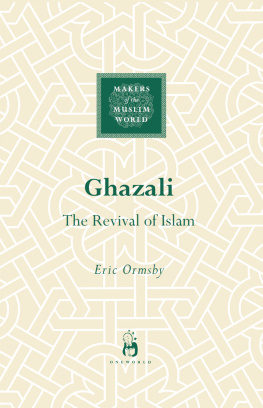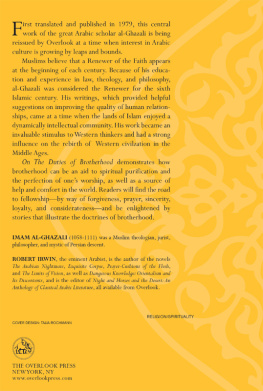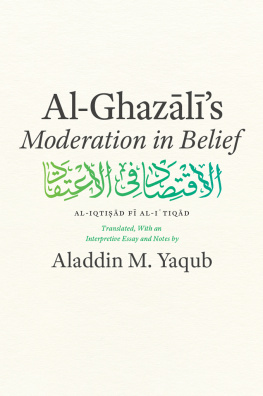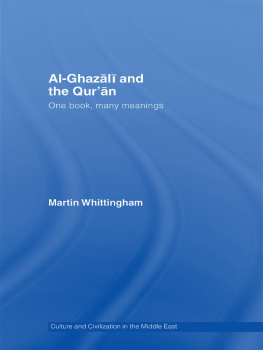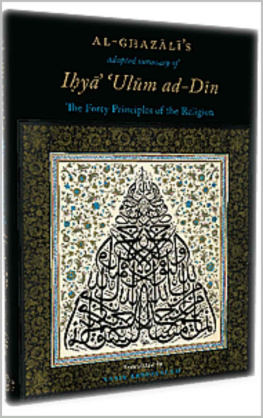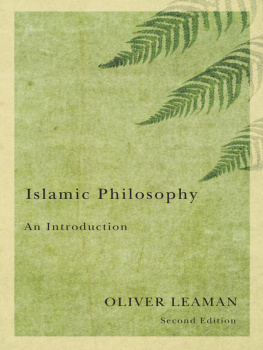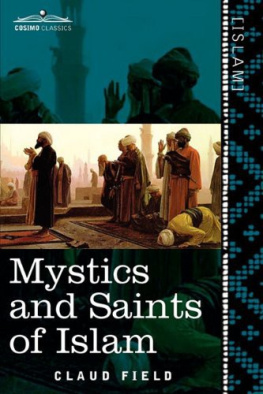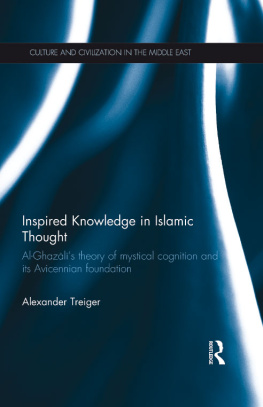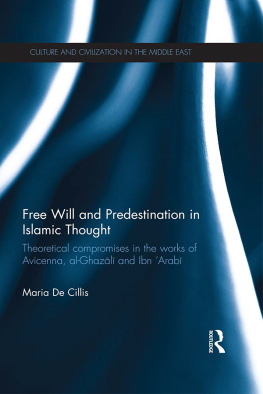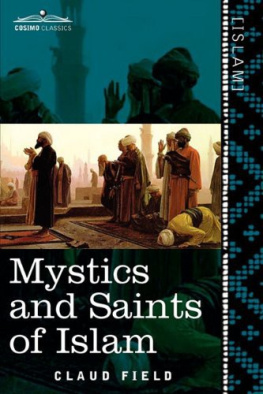
Ghazali
SERIES EDITOR: PATRICIA CRONE, INSTITUTE FOR ADVANCED STUDY, PRINCETON
Abd al-Malik, Chase F. Robinson
Abd al-Rahman III, Maribel Fierro
Abu Nuwas, Philip Kennedy
Ahmad ibn Hanbal, Christopher Melchert
Ahmad Riza Khan Barelwi, Usha Sanyal
Al-Mamun, Michael Cooperson
Al-Mutanabbi, Margaret Larkin
Amir Khusraw, Sunil Sharma
El Hajj Beshir Agha, Jane Hathaway
Fazlallah Astarabadi and the Hurufis, Shazad Bashir
Ibn Arabi, William C. Chittick
Ibn Fudi, Ahmad Dallal
Ikhwan al-Safa, Godefroid de Callatay
Shaykh Mufid, Tamima Bayhom-Daou
For current information and details of other books in the series, please visit www.oneworld-publications.com

GHAZALI
A Oneworld Book
Published by Oneworld Publications 2008
This ebook edition first published in 2013
All rights reserved
Copyright under Berne Convention
A CIP record for this title is available from the British Library
ISBN-13: 9781851684144
ebook ISBN: 9781780742052
Copyright Eric Ormsby 2008
Typeset by Jayvee, Trivandrum, India
Oneworld Publications
10 Bloomsbury Street
London WC1B 3SR
England
www.oneworld-publications.com
Learn more about Oneworld. Join our mailing list to find out about our latest titles and special offers at:
www.oneworld-publications.com
PREFACE
I n this book, I aim to convey the essentials of the life and thought of a religious genius too little known beyond the specialist world. For the breadth, subtlety and influence of his work, Ghazali deserves to be counted among the great figures in intellectual history, worthy to be ranked with Augustine and Maimonides, Pascal and Kierkegaard. This book is intended for readers with no previous knowledge of Ghazali or indeed of Islamic intellectual history. This means I have been obliged to summarize and simplify many crucial points, though not, I hope, to over-simplify.
I refer to Ghazalis works by their original Arabic titles, often in shortened form; these are listed in the table of abbreviations. In referring to Ghazalis masterpiece, the Ihya ulum al-din, I have sometimes referred to it as The Revival and sometimes as the Ihya. Ive tried wherever possible to key my references to existing English translations (which Ive occasionally modified); translations without attribution are my own. Since many Arabic names and terms used will be unfamiliar to non-specialist readers, Ive included brief descriptions of the various political entities and schools of thought they represent in the introduction.
I would like to thank Professor Patricia Crone for inviting me to contribute this volume to the series. I am grateful too for her comments and suggestions which have improved the work throughout. The anonymous reader for Oneworld offered several criticisms from which I have benefited and for which I express my thanks. Finally, I am grateful to Mike Harpley at Oneworld, who has been a most patient and helpful editor.
ABBREVIATIONS
Bouyges | Maurice Bouyges, Essai de chronologie des uvres de Al-Ghazali (Algazel) |
CHI | The Cambridge History of Iran |
EI2 | The Encyclopaedia of Islam (2nd edition) |
Faysal | Ghazali, Faysal al-tafriqa |
Hourani | A Revised Chronology of Ghazalis Writings JAOS (1984) |
Ihya | Ghazali, Ihya ulum al-din |
Iqtisad | Ghazali, al-Iqtisad fil-itiqad |
Jawahir | Ghazali, Jawahir al-Quran |
Letter | Ghazali, Letter to a Disciple: Ayyuhal-Walad |
Maqasid | Ghazali, Maqasid al-falasifa |
McCarthy | Freedom and Fulfillment: an Annotated Translation of Al-Ghazalis al-Munqidh min al-Dalal |
Munqidh | Ghazali, al-Munqidh min al-Dalal |
Qur. | Quran (Koran) |
The Revival | Ghazali, Ihya ulum al-din |
Tahafut | Ghazali, Tahafut al-falasifa |
NAMES AND TERMS
Asharite the school of Sunni theology founded by Ashari (d. 938).
Buyid Shiite dynasty in power from c. 932 to 1062, overthrown by the Seljuqs.
dhawq taste, a Sufi technical term for unmediated mystical experience.
Falsafa Islamic Aristotelean philosophy (from Greek philosophia).
Fatimids Shiite Ismaili dynasty in Egypt and N. Africa from 9091171.
fiqh Islamic law.
Hadith the attested words and deeds of the Prophet Muhammad.
Hanafi The school of Sunni law based on the teachings of Abu Hanifa.
Hanbali The school of Sunni law based on the teachings of Ahmad ibn Hanbal.
Imam Prayer leader; in Shiite tradition, the divinely designated guide of the community, sinless and infallible.
Ismaili Shiite sect which broke from mainstream Shiism after 762 and which acknowledges a line of seven imams; hence known as Seveners.
Kalam Islamic theology much given to dialectic and disputation (literally, discourse).
madhhab school of law or theology, e.g., the Hanbali school.
madrasa institution of learning, college, e.g., the Nizamiya madrasa.
Maliki the school of Sunni law deriving from the teachings of Malik ibn Anas.
Mutazili school of theology characterized by pronounced rationalism.
Seljuq Sunni Turkic dynasty in power from c. 1038 to 1194.
Shafiite the school of Sunni law based on the teachings of Shafii.
Sunna prescribed, normative behavior modeled on the example of the Prophet.
taqlid belief based on authority, rather than independent reasoning.
usul al-fiqh legal theory, the roots of the law.
CHRONOLOGY
1058c. 107273 | Born in a village near Tus in northeast Iran. Studies at Tus under the Imam Radhakani and at Jurjan with the Imam Abu Nasr al-Ismaili. |
c. 107778 | Returns to Tus for three further years of study. Travels to Nishapur where he pursues advanced studies with the jurist and theologian Juwayni and the Sufi master Farmadhi. |
108586 | Death of Juwayni. Attracts the patronage of the vizier Nizam al-Mulk and joins the court-camp of the Seljuq Sultan Malik Shah as professional jurist and theologian. |
Next page
